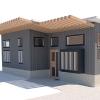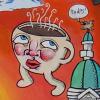UGA Fights Obesity in Clarke County Public Schools
Health & Fitness Issue

Photo Credit: Randy Schafer
Students at Fowler Drive Elementary School participate in a UGA after-school program that teaches them the athletic skills they need to stay in shape.
Exercise helps you feel good and stay fit, and University of Georgia researchers are looking at a new way staying active can help in the classroom.
Several UGA kinesiology professors have studied how after-school physical activity programs help students in Clarke County elementary schools. New this fall, they added a team of educational psychology and public health experts to figure out how increasing students’ heart rates helps with homework and comprehension.
The research team works with 60 students between second and fifth grade each day at Chase Street and Fowler Drive elementary schools. After school, the students spend 45 minutes on homework, 45 minutes on physical activity games and then an hour on math or literary enrichment. Throughout the year, the UGA researchers plan to track how students improve in movement, numbers and reading.
“They’re learning how to play and exercise in ways that help their brains,” says Bryan McCullick, a UGA kinesiology professor. “They learn together how to make decisions, create strategies and problem solve while being physically active.”
McCullick and fellow kinesiology professor Phil Tomporowski have researched the links between physical activity and academic achievement for more than a decade. They developed the physical activity games to build children’s confidence and get them moving outside of recess time. The 45 games are outlined in their upcoming book, Enhancing Children’s Cognition with Physical Activity Games.
The physical activity games require students to build on basic physical skills, such as passing, shooting, dribbling, tossing and jumping. During a game called Master Passers, for example, students split into two teams and focus on passing a ball to team members. Every few minutes, one of the researchers stops the game to introduce a new rule or strategy, such as passing overhand or underhand. In another game, students split into several teams and align themselves with a color—yellow, red, green or purple—and try to defend their hula hoop filled with balls, batons and exercise bands with the same color. The first team to collect items from the other teams’ hoops wins. Then the strategy reverses, and each team must replace all of the items from its color in the hula hoop.
“Adults may be able to run on a treadmill for 45 minutes, but kids don’t want to do that,” McCullick says. “If you want to help them be motivated to exercise, you have to do something they enjoy and feel comfortable doing.”
After the exercise program each day, Chase Street students focus on math enrichment, and Fowler Drive students focus on reading comprehension. In the spring, the enrichment teams will switch schools so both groups of students will practice math and reading. The math program focuses on ordering numbers and computation through games. For example, one lesson encourages students to draw numbers from a basket and stand in line according to their number. This gives them an opportunity to understand whole numbers, decimals and fractions and how they relate to each other. In another lesson, students play card games and add, multiply or divide the numbers based on the rules.
“In our culture, there’s an idea that people are either good at math or bad at math, and that’s a huge problem,” says Marty Carr, the UGA educational psychologist who directs the math-enrichment project. “That mentality often develops in elementary school, and we need to directly address it. People who are good at math are the ones who practice it.”
The same confidence issue from the physical activity portion rings true in the math program as well, Carr says. If students feel fluent and competent in math, they’re willing to work more. If they begin second grade with strong computation skills, research shows they’re more likely to do well on standardized tests in fourth grade, she says.
“When a teacher starts talking about adding the 10s and ones and the student understands it without hesitation, that confidence is going to translate into a love of math early in life,” Carr says. “I don’t think teachers and parents are telling kids that math is hard, but it’s part of our culture, and we need to deal with it.”
At Fowler Drive, students are practicing their literacy skills by reading science texts and biographies. They learn how to tackle difficult textbook information by paying attention to headlines and bold terms. They also pull apart unfamiliar words by looking at prefixes, suffixes and context clues in the sentence. For example, one text highlights water-related science and the term “aqua” in relation to aquariums and aquatics.
“Kids don’t get nearly enough time to work on their reading,” says Paula Schwanenflugel, the UGA educational psychologist who directs the literary enrichment project. “Informational texts are the hardest, and comprehension sinks as they head toward middle school.”
For science texts, many students are two years below their reading level, she says. During the after-school enrichment program, students improve literacy by reading books with certain themes, usually in pairs or in groups to improve oral reading skills. The students also do hands-on activities to help comprehension.
“As they progress, the students feel that they can tackle informational texts, and that science itself is interesting,” Schwanenflugel says. “When they gain a certain comfort level, they may even read more in their own free time.”
As the program continues at both schools, the research team will incorporate more community involvement to promote physical activity, nutrition and learning outside of school — even for parents. By pairing with the schools during annual events, such as open house nights when parents visit the schools, the team will offer activities for parents and students to do together. They also encourage parents to explore new options for physical and academic-related activities in Athens, such as children’s programs at the State Botanical Garden or the Athens-Clarke County Library.












comments